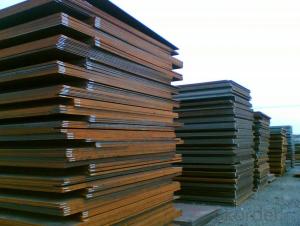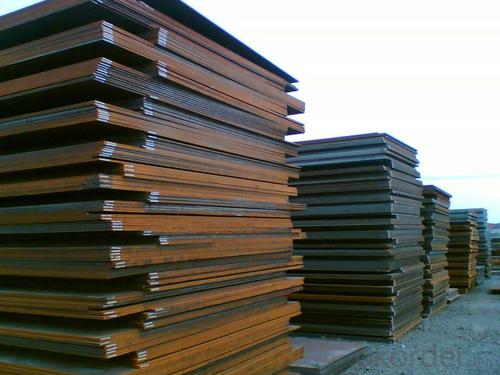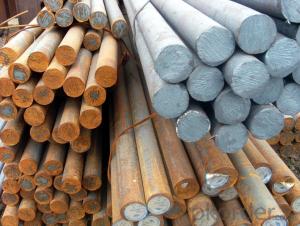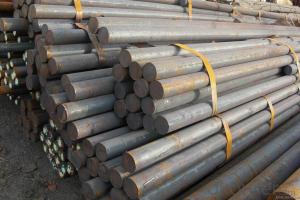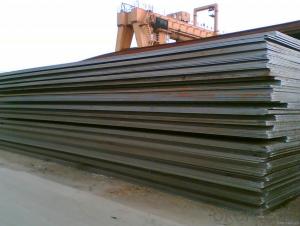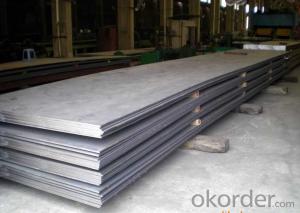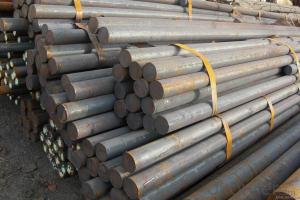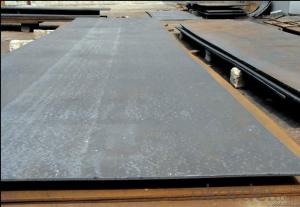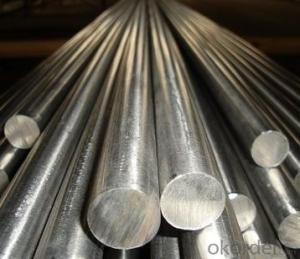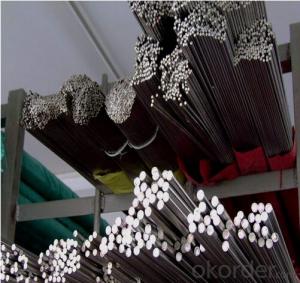D3M Steel Plate Special Steel Carbon Steel
- Loading Port:
- China main port
- Payment Terms:
- TT OR LC
- Min Order Qty:
- 25 m.t.
- Supply Capability:
- 10000 m.t./month
OKorder Service Pledge
OKorder Financial Service
You Might Also Like
Specification
Chemical Composition(GB %)
| C | Si | Mn | Cr | V | S | P |
| 1.4 | 0.35 | 0.35 | 8.00 | 0.15 | ≤0.030 | ≤0.030 |
Available Size
| Rolled flat steel | 12-90mm×205-610mm×L |
Heat Treatment
| Item | Temperature℃ | Hardness |
| Anneal | 850-870 | ≤255HB |
| Quenching | 920-980 | 64-66HRC |
| Tempering | 200 | 61-63HRC |
Characterstics
| 1.New type of chromium containing high carbon cold working die steel | |||||
| 2.Better hardening ability and high abrasion resistance |
Applications: Suitable for various codl working dies with higher abrasion resistance


1, Your advantages?
professional products inquiry, products knowledge train (for agents), smooth goods delivery, excellent customer solution proposale
2, Test & Certificate?
SGS test is available, customer inspection before shipping is welcome, third party inspection is no problem
3, Payment Terms?
30% TT as deposit and 70% before delivery.
Irrevocable L/C at sight.
4, Trading Terms?
EXW, FOB, CIF, FFR, CNF
3, After-sale Service?
We provides the services and support you need for every step of our cooperation. We're the business partner you can trust.
For any problem, please kindly contact us at any your convenient time.
We'll reply you in our first priority within 24 hours.
- Q: What are the different power generation grades of special steel?
- There are various power generation grades of special steel, such as P91, P92, and P22. These grades are specifically designed to withstand high temperatures and pressures in power generation applications, ensuring the reliability and efficiency of power plants.
- Q: What are the main advantages of using special steel in the oil and gas industry?
- The main advantages of using special steel in the oil and gas industry include its high strength, corrosion resistance, and ability to withstand extreme temperatures and pressures. Special steel is specifically designed and manufactured to meet the demanding requirements of the industry, ensuring reliable performance and longevity. It also offers excellent weldability, which is crucial for constructing pipelines and equipment used in oil and gas operations. Additionally, special steel's durability and resistance to fatigue make it ideal for withstanding the harsh conditions and environments encountered in the oil and gas sector.
- Q: What are the requirements for special steel used in telecommunications equipment manufacturing?
- The requirements for special steel used in telecommunications equipment manufacturing can vary depending on the specific application and intended use. However, there are certain general requirements that are commonly sought after in this industry. Firstly, the special steel used in telecommunications equipment manufacturing should possess excellent mechanical properties, including high strength, toughness, and durability. This is crucial as telecommunications equipment often needs to withstand harsh weather conditions, extreme temperatures, and various environmental factors while maintaining its structural integrity. Secondly, the steel should have excellent corrosion resistance properties. Telecommunications equipment is often installed outdoors or in environments with high humidity, saltwater exposure, or chemical pollutants, which can lead to corrosion. Therefore, the special steel used in manufacturing such equipment should be resistant to corrosion to ensure longevity and reliable performance. Another important requirement is electromagnetic compatibility (EMC). Telecommunications equipment operates in an environment with various electrical and electromagnetic signals. The steel used should possess good electrical conductivity and magnetic permeability to minimize interference and maintain signal integrity. Additionally, the special steel used in telecommunications equipment manufacturing should have good thermal conductivity properties. This is important to dissipate heat generated during operation, preventing overheating and ensuring the equipment's reliability. Furthermore, the steel should be easily machinable and weldable to facilitate the manufacturing process. Ease of fabrication and forming is crucial to meet the specific design requirements of telecommunications equipment. Lastly, compliance with industry standards and regulations is essential. The special steel used in telecommunications equipment manufacturing should meet the relevant international standards and certifications to ensure safety, quality, and compatibility with other components in the telecommunication network. In summary, the requirements for special steel used in telecommunications equipment manufacturing include excellent mechanical properties, corrosion resistance, electromagnetic compatibility, thermal conductivity, machinability, and compliance with industry standards. Meeting these requirements ensures the production of high-quality and reliable telecommunications equipment.
- Q: What are the different types of nitriding steel?
- There are several different types of nitriding steel, including gas nitriding steel, liquid nitriding steel, salt bath nitriding steel, and plasma nitriding steel.
- Q: What are the different methods of surface pickling for special steel?
- Pickling special steel can be achieved through various methods. These methods comprise acid pickling, electrolytic pickling, mechanical pickling, and passivation. The most commonly employed method for pickling special steel is acid pickling. It entails immersing the steel in an acid solution, typically hydrochloric acid or sulfuric acid, to eliminate any surface impurities. By reacting with the steel's oxide layer, the acid dissolves it, leaving a pristine surface. Electrolytic pickling, on the other hand, involves passing an electric current through the steel submerged in an electrolyte solution. This creates a chemical reaction that removes surface impurities. Electrolytic pickling offers better control and enables a more consistent surface finish compared to acid pickling. Mechanical pickling utilizes abrasive materials like sandpaper or wire brushes to physically scrub the steel's surface and eliminate any scale or rust. It is often combined with acid or electrolytic pickling to achieve the desired surface finish. After pickling, special steel can undergo passivation to enhance its corrosion resistance. Passivation entails treating the steel with a chemical solution, typically nitric acid or citric acid, to form a protective oxide layer on the surface. This layer prevents further corrosion and enhances the steel's overall durability. It's worth mentioning that the specific method of surface pickling for special steel may vary depending on factors such as the type of steel, desired surface finish, and intended application. Therefore, it is essential to consult experts or adhere to the manufacturer's guidelines to ensure the appropriate pickling method is employed for special steel.
- Q: How does special steel contribute to improving product durability?
- Special steel contributes to improving product durability by providing enhanced strength, corrosion resistance, and wear resistance properties. Its unique composition and manufacturing processes make it highly resilient to mechanical stress, extreme temperatures, and harsh environmental conditions, thus ensuring the longevity and reliability of the products it is used in. Furthermore, special steel's exceptional properties allow for the production of lighter and more compact components, leading to increased efficiency, reduced maintenance needs, and improved overall product performance.
- Q: What are the different quenching techniques used for special steel?
- There are several different quenching techniques used for special steel, including oil quenching, water quenching, and air quenching. Oil quenching involves immersing the steel in oil to rapidly cool it and achieve the desired hardness. Water quenching is a more aggressive technique, where the steel is submerged in water to achieve even faster cooling and increased hardness. Air quenching, on the other hand, involves allowing the steel to cool in ambient air, resulting in a slower cooling rate and less hardness. Each technique has its own advantages and is chosen based on the specific requirements of the steel being quenched.
- Q: What are the different methods of strengthening special steel?
- There are several methods to strengthen special steel, including heat treatment, cold working, alloying, and precipitation hardening. Heat treatment involves heating the steel to a specific temperature and then cooling it rapidly or slowly to alter its microstructure and improve its strength. Cold working involves subjecting the steel to mechanical stress, such as rolling or bending, to increase its strength. Alloying involves adding other elements to the steel to enhance its properties, such as manganese, chromium, or nickel. Precipitation hardening involves a two-step process of solution treatment and aging, where the steel is heated and then cooled to form precipitates that strengthen the material.
- Q: What are the different shot blasting techniques used for special steel?
- Some of the different shot blasting techniques used for special steel include wheel blasting, air blasting, and tumble blasting. Wheel blasting uses a high-speed rotating wheel to propel abrasive particles at the steel surface, while air blasting involves using compressed air to propel the particles. Tumble blasting, on the other hand, involves placing the steel in a rotating drum and allowing the abrasive particles to impact the surface as the drum rotates. These techniques help to remove surface contaminants, improve surface finish, and enhance the overall quality of the special steel.
- Q: What is the significance of alloying elements in special steel?
- Alloying elements play a crucial role in special steel as they enhance the mechanical properties, corrosion resistance, and overall performance of the steel. These elements are added in specific proportions to alter the microstructure and create desired properties such as increased strength, hardness, toughness, and heat resistance. Additionally, alloying elements can improve the steel's ability to withstand extreme conditions, such as high temperatures or corrosive environments. Overall, the presence of alloying elements in special steel allows for the production of tailor-made materials that meet specific application requirements in industries such as automotive, aerospace, and construction.
Send your message to us
D3M Steel Plate Special Steel Carbon Steel
- Loading Port:
- China main port
- Payment Terms:
- TT OR LC
- Min Order Qty:
- 25 m.t.
- Supply Capability:
- 10000 m.t./month
OKorder Service Pledge
OKorder Financial Service
Similar products
Hot products
Hot Searches
Related keywords
